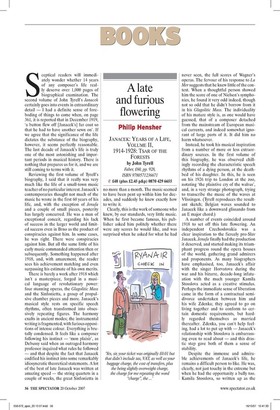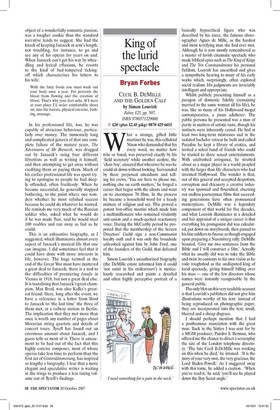A late and furious flowering
Philip Hensher JANACEK: YEARS OF A LIFE, VOLUME II, 1914-1928: TSAR OF THE FORESTS by John Tyrell Faber, £60, pp. 928, ISBN 9780571236671 £48 (plus £2.45 p&p) 0870 429 6655 Sceptical readers will immediately wonder whether 14 years of any composer's life really deserve over 1,000 pages of biographical examination. The second volume of John Tyre11's Janacek certainly goes into events in extraordinary detail — I had a definite sense of foreboding of things to come when, on page 361, it is reported that in December 1919, 'a button flew off [Janacek's] fur coat so that he had to have another sewn on'. If we agree that the significance of the life dictates the substance of the biography, however, it seems perfectly reasonable. The last decade of Janacek's life is truly one of the most astonishing and important periods in musical history. There is nothing that prepares us for it, and we are still coming to terms with it.
Reviewing the first volume of Tyre11's biography, I said that it really was very much like the life of a small-town music teacher of no particular interest. Janacek's contemporaries thought not much of the music he wrote in the first 60 years of his life, and, with the exception of Jenufa and a couple of small pieces, posterity has largely concurred. He was a man of exceptional conceit, regarding his lack of success in the larger world and limited success even in Brno as the product of conspiracies against him. In some cases, he was right. There were conspiracies against him. But all the same little of his early music commanded attention then or subsequently. Something happened after 1918, and, with amazement, the reader sees his achievement matching and even surpassing his estimate of his own merits.
There is barely a work after 1918 which isn't a masterpiece, forged in a musical language of revolutionary power: four stunning operas, the Glagolitic Mass and the Sinfonietta, a group of propulsive chamber pieces and more. Janacek's musical style rests on specific speech rhythms, often transformed into obsessively repeating figures. The harmony exults in ancient modes; the instrumental writing is fragmented, with furious oppositions of intense colour. Everything is brutally condensed. It feels like a composer following his instinct — 'mon plaisir', as Debussy said when an outraged harmony professor inquired what rules he followed — and that despite the fact that Janacek codified his instinct into some remarkably idiosyncratic theoretical statements. A lot of the best of late Janacek was written at amazing speed — the string quartets in a couple of weeks, the great Sinfonietta in no more than a month. The music seemed to have been pent up within him for decades, and suddenly he knew exactly how to write it.
Clearly, this is the work of someone who knew, by our standards, very little music. When he first became famous, his publisher asked him politely whether there were any scores he would like, and was surprised when he asked for what he had never seen, the full scores of Wagner's operas. The fervour of his response to La Mer suggests that he knew little of the context. When a thoughtful person showed him the score of one of Nielsen's symphonies, he found it very odd indeed, though not so odd that he didn't borrow from it in his Glagolitic Mass. The individuality of his mature style is, as one would have guessed, that of a composer detached from the mainstream of European musical currents, and indeed somewhat ignorant of large parts of it. It did him no harm whatsoever.
Instead, he took his musical inspiration from a number of more or less extraordinary sources. In the first volume of this biography, he was observed chillingly recording the characteristic speech rhythms of a dying person, at the deathbed of his daughter. In this, he is seen on his 1926 trip to London at the zoo, notating 'the plaintive cry of the walrus', and, in a very strange photograph, trying to transcribe the music of the waves at Vlissingen. (Tyrell reproduces the resultant sketch; Belgian waves sounded to Janacek like a downward glissando from an E major chord.) A number of events coincided around 1918 to set off this late flowering. An independent Czechoslovakia was a clear inspiration to the fiercely pro-Slav Janacek. Jenufa finally had the production it deserved, and started making its triumphant progress round the opera houses of the world, gathering grand admirers and proponents. As many biographers have emphasised, too, Janacek's affair with the singer Horvatova during the war and his bizarre, decade-long infatuation with the much younger Kamila Stosslova acted as a creative stimulus. Perhaps the immediate sense of liberation came in the form of a contractual semidivorce undertaken between him and his wife Zdenka; they agreed to go on living together and to conform to certain domestic requirements, but hardly regarded themselves as married thereafter. Zdenka, you can't help feeling, had a lot to put up with — Janacek's relationship with Stosslova is embarrassing even to read about — and this drastic step gave both of them a sense of stability.
Despite the immense and admirable achievements of Janacek's life, he remains a difficult person to like. He was, clearly, not just touchy in the extreme but when he had the opportunity a bully too. Kamila Stosslova, so written up as the object of a wonderfully romantic passion, was a tougher cookie than the standard narrative tends to suggest. She had the knack of keeping Janacek at arm's length, not troubling, for instance, to go and see any of his operas for years on end. When Janacek can't get his way by wheedling and lyrical effusions, he resorts to the kind of bad-tempered tickingoff which characterises his letters to his wife: With the fatty foods you must wash out your body once a year. Fat prevents the blood from flowing and the creation of blood. That's why your feet ache. If I were at your place I'd order comfortable shoes on, into the forests, physical exercise, bathing, massage.
In his professional life, too, he was capable of atrocious behaviour, particularly over money. The immensely long and complicated genesis of that one complete failure of the mature years, The Adventures of Mr Broucek, was dragged out by Janacek's using four different librettists as well as writing it himself, and then attempting to get away without crediting them or paying them. Much of his earlier professional life was spent trying to apologise to people he had deeply offended, often fruitlessly. When he became successful, he generally stopped bothering, to the point where one wonders whether he most relished success because he could do whatever he wanted. He reminds me very much of the Russian soldier who, asked what he would do if he was made Tsar, said he would steal 100 roubles and run away as fast as he could.
This is an exhaustive biography, as I suggested, which illuminates almost every aspect of Janacek's musical life that one can imagine. I did sometimes feel that it could have done with more interests in life, however. The huge turmoil at the end of the Great War must have mattered a great deal to Janacek; there is a nod to the difficulties of premiering Jenufa in Vienna in 1918, but not a great deal else. It is tantalising that Janacek's great champion, Max Brod, was also Kafka's greatest friend. Here, long after the event, we have a reference in a letter from Brod to Janacek to 'the last time' the three of them met, at a railway station in Berlin. The implication that they met more than once is worth any number of pages about Moravian string quartets and details of concert tours. Tyre11 has found out an enormous amount about Janacek, and I guess tells us most of it. There is amusement to be had out of the fact that this highly concise composer, most of whose operas take less time to perform than the first act of Gotterdammerung, has inspired so lengthy a biography. I fear that a more elegant and speculative writer is waiting in the wings to produce a less taxing volume out of Tyre11's findings.








































































 Previous page
Previous page